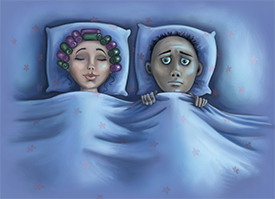
Image Credit: Kamenuka/SHUTTERSTOCK.COM
Chronic insomnia is a common complaint for patients with rheumatic diseases and conditions. In fact, sleep disturbances are among the most common symptoms of both fibromyalgia and rheumatoid arthritis (RA), with more than 50% of chronic pain patients reporting sleep disturbances.
Pain combined with insomnia can lead to a vicious cycle, says Ruth Gentry, PhD, a licensed clinical psychologist in Reno, Nev., who specializes in cognitive-behavior therapy for chronic pain. Pain makes sleep more difficult, and sleep deprivation can exacerbate pain.
New Studies Highlight Risk of Sleeping Pills
In their quest for a good night’s sleep, it’s not uncommon for patients to turn to over-the-counter sleeping pills. In addition, diphenhydramine, better known as Benadryl, has long been prescribed in skilled nursing facilities and hospitals as a sleep aid. However, a new study offers compelling evidence of a link between dementia and long-term anticholinergic medications, such as diphenhydramine, and nonprescription sleep aids.1 In addition, a 2014 study found that older adults who use benzodiazepines (e.g., alprazolam, diazepam, lorazepam) to reduce anxiety or induce sleep are at a greater risk of developing Alzheimer’s disease.2
Evidence also links the popular sleep medication Ambien to confusion in older adults and an increased risk of falls. Another study found the rate of falls increased nearly six times among patients taking the hypnotic, zolpidem (Ambien). The study also noted that zolpidem is the most commonly prescribed hypnotic sleep aid at many hospitals and encourages doctors to consider nonpharmacologic sleep enhancements.3
Addressing Insomnia as Part of a Treatment Plan
An interview with Michael Smith, PhD, of the Johns Hopkins Behavioral Sleep Medicine Program in Baltimore, published on the Lupus Foundation’s website, reports that 50–60% of people with lupus and other chronically painful conditions experience sleep deficit. In addition, Dr. Smith says lack of sleep compromises the immune system, interferes with cognition and increases symptoms of lupus, such as pain, inflammation and fatigue. He says chronic insomnia shouldn’t be ignored, but rather addressed by doctors as part of an overall treatment plan.
“Rheumatologists know poorly controlled pain can often cause difficulty sleeping, but they often don’t think about the patient having a separate sleep disorder that might be fueling the pain,” says Terry Cralle, RN, MS, CPHQ, a certified sleep specialist and co-founder of a sleep disorders clinic in Charlottesville, Va.
For this reason, Ms. Cralle says it’s important for rheumatologists to refer their patients with chronic pain for a sleep evaluation to determine if there is an underlying cause, such as sleep apnea or restless leg syndrome. The Stanford Center for Sleep Sciences and Medicine in Redwood City, Calif., notes that there are over 100 types of sleep disorders ranging from difficulty sleeping at night to problems with excessive daytime sleeplessness.


